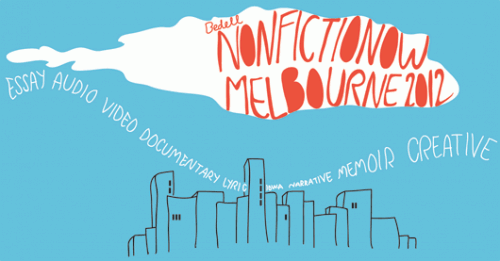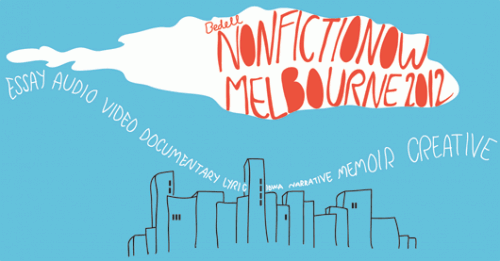
Toni Nealie Presents at NonfictioNow in Melbourne
This week, Nonfiction MFA candidate Toni Nealie guest blogs about presenting at the NonfictioNow conference in Melbourne.
The kangaroo skewers tasted somewhat like venison, the prawns were succulent and garlicky—juicy substitutes for turkey and pumpkin pie. This Thanksgiving, I left my family in Chicago and flew to Melbourne, Australia, where I was a panelist at the Bedell NonfictioNow Conference. The conference was held at RMIT University, which was the first time that the international conference was convened outside the United States instead of its University of Iowa home. This was my first time attending NonfictioNow and my first time presenting at any writers’ conference.
Hearing diverse writers read their work, listening to panel discussions about the cogs of writing and publishing, and chatting with writers over lunch or coffee were highlights. I enjoyed the international perspectives, and I had great access to people who were very generous with their time after their keynotes and panels. Margo Jefferson, David Shields, Cheryl Strayed, and Robin Hemley were insightful and very warm to chat with. I discussed memoir with Ira Sukrungruang (Talk Thai, USF), diaspora with Mary Anne Mohanraj (Bodies in Motion, UIC), essays with Amy Butcher (an Iowa graduate now at Colgate), feminist blogging with Kate Butler, and academia with Ruth Walker (UWollongong). The Australians were warm and welcoming. I came home with a long list of contacts and many useful ideas for teaching and writing.

RMIT University, Melbourne. Photo Credit: http://www.geelab.rmit.edu.au
My panel Writing About Crime in the Family included Garnett Kilberg Cohen (Columbia College Chicago), Marsha Berry (RMIT), Olivia Guntarik (RMIT), and Sydney Smith. The panel covered political crimes in Russia and Borneo, incest, a family suicide, a murder, and manslaughter. We discussed what constitutes a crime, why and how do we write about them, and what dilemmas come up, such as shame, secrecy, biases, lies, and family myth-making. It was a steamy afternoon, the last day of the conference, and the front door of the venue was locked for the weekend, so we were pleasantly surprised by a great turnout and lively questions from the audience. Crime does pay, in writing at least. Our panel was one of two on crime, and they were both very popular.
So how did I get to travel down under to be on a panel? The opportunity was an incredibly lucky one. The director of my Creative Writing – Nonfiction MFA program, Dr Jenny Boully, put the conference on my radar last year, then in April I heard Robin Hemley read at Columbia. He is the director of the Nonfiction program at Iowa, and the Co-Chair of NonfictioNow. I joined him and a bunch of people for dinner and chatted with Professor Garnett Kilberg Cohen about the theme of family crime in our work. A submission idea was born. Garnett, who has been a wonderful mentor since I took some undergraduate classes in the English Department, emailed our proposal the next day, and it was accepted. A former colleague, Dr Shirley Leitch from Swinburne University, hosted me, and the English Department generously funded my travel. My thesis workshop instructor Aviya Kushner suggested I make a card with details of my project to distribute, which gave me a summary and conversation-starter on hand and served as an invitation to our panel. My MFA cohort helped me rehearse a short piece of writing and calmed my nerves. Writing really is a collaborative art! I’m grateful to Columbia and my program for fostering this rich learning opportunity.

